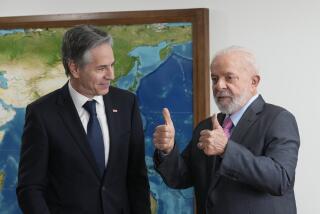New Minister Prescribes Austerity for Brazil
- Share via
RIO DE JANEIRO — Luiz Carlos Bresser Pereira, Brazil’s new finance minister, is prescribing a more austere policy for managing this country’s troubled and deeply indebted economy.
Bresser, 53, says economic growth will come down to a modest 3% or 3.5% this year. He says that government budget deficits will be cut back and that increases in real wages will be kept in line with productivity gains.
According to Bresser, this will permit Brazil to resume payments to private foreign banks at about half the levels currently due. Brazil suspended interest payments to foreign banks in February.
Bresser’s policy views have emerged from public statements made before and since he was sworn in Wednesday as finance minister. He replaced Dilson Funaro, who resigned amid widespread discontent with the government’s economic performance.
In his first press conference as finance minister, Bresser said that his “medium-run” growth goal is 6% to 7% but that for this year it is 3% to 3.5%. The lower rate, he said, is necessary to correct distortions in the economy because, at 8.5%, it grew “too much” last year.
On Brazil’s foreign debt moratorium, Bresser said: “We are going to maintain it until we can present a plan of adjustment in the Brazilian economy that is not recessive but coherent. Based on that plan, we are going to renegotiate with the bankers.”
In a local newspaper interview last week, before his appointment, Bresser said the country needs to achieve a yearly trade surplus of $9 billion “to be able to pay more or less 50% of the interest on medium-term loans from the private banks.” He added that he thought “the bankers consider that number to be reasonable.”
To reach that trade-surplus level, he said that the domestic economy must be temporarily geared down and readjusted and that the currency must be devalued.
In a speech at his swearing-in Wednesday, Bresser said, “We are perfectly capable of carrying out an austere and responsible economic policy, as the moment requires and as we are going to do.”
In a television interview Thursday, he said he has no immediate plans for a price freeze to halt inflation, which is running at 15% a month. “At the moment that is impossible,” he said, mainly because a “very high public deficit” is creating too much inflationary pressure.
More to Read
Sign up for Essential California
The most important California stories and recommendations in your inbox every morning.
You may occasionally receive promotional content from the Los Angeles Times.










